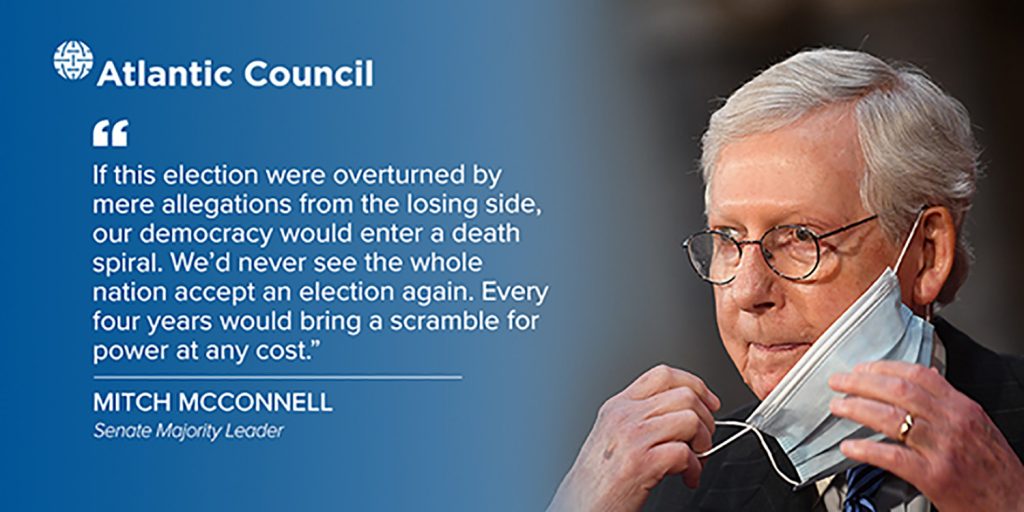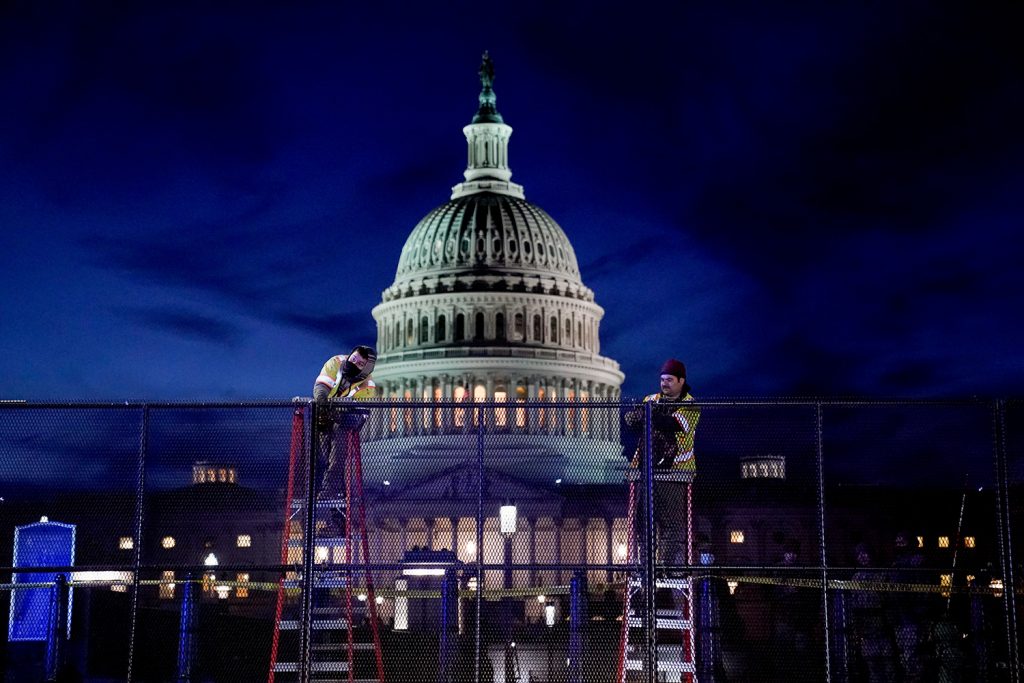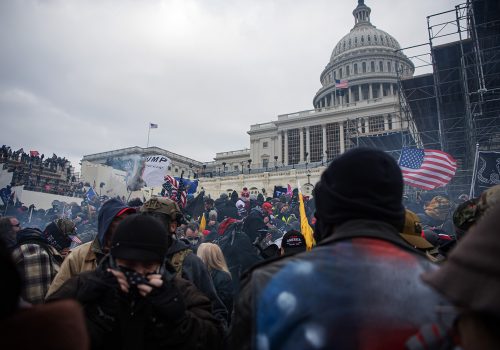A lawyer friend tells me there’s a strong prima facie case against President Donald Trump, which means enough corroborating evidence exists to support charges that he, at the very least, violated federal laws against insurrection and rebellion.
US code reads: “Whoever incites, sets on foot, assists, or engages in any rebellion or insurrection against the authority of the United States or the laws thereof, or gives aid or comfort thereto, shall be fined under this title or imprisoned not more than ten years, or both, and shall be incapable of holding any office under the United States.”
Democrats in the US House of Representatives plan to introduce articles of impeachment on Monday with similar language on the incitement of insurrection.
Speaker Nancy Pelosi would prefer that the threat of impeachment, which would make Trump the only president to have been impeached twice, prompts the president to resign before his term ends on Jan. 20. She is also exploring a second option: that Vice President Mike Pence and the Cabinet—or the vice president and a non-partisan group established by Congress—remove Trump through the 25th Amendment.
Some Republicans, who hope to regain influence over the party after the Trump presidency, argue the best course would be to shun the president, deprive him of the attention that is his oxygen, ensure guardrails prevent him from dangerous acts in the coming days, and simply run out the clock. Even some Democrats prefer this approach, hoping to avoid energizing Trump and his millions of supporters with further grievances.
So, which of these options would provide the United States the best chance to heal quickly at home so it can act more effectively abroad?
Get the Inflection Points newsletter
Subscribe to Frederick Kempe’s weekly Inflection Points column, which focuses on the global challenges facing the United States and how to best address them.
As unlikely as it seems that Trump would step down, his resignation in the next week would serve him and the country best. Even the Wall Street Journal editorial board, that bastion of American conservatism, argues that resignation would be the best-case outcome.
Trump’s resignation would provide President-elect Joe Biden his best “shot” (with a nod to Hamilton) at being the healing and unifying leader he aspires to be, allowing the country to avoid another polarizing impeachment brawl. It also would be the one that best leverages for positive gain the horrifying events of last week that were so closely followed by the edifying congressional certification of November’s elections.
In those few hours, a worried nation and world witnessed both the vulnerability and resilience of what former Polish President Aleksander Kwasniewski this week at the Atlantic Council called the “world’s guarantor of democracy. The country where institutions work and there is rule of law.”
For that guarantor to fail “at the direction of the American president is something unacceptable,” Kwasniewski argued. The impact would be disastrous not just for American prestige but for its impact on other world democracies. If it can happen in Washington, goes his logic, it can happen anywhere.
Coming back to the Wall Street Journal‘s editorial, it called this week’s attack on the Capitol “an assault on the constitutional process of transferring power after an election… This goes beyond merely refusing to concede defeat. In our view, it crosses a constitutional line that Mr. Trump hasn’t previously crossed. It is impeachable.”
After consideration of the pros and cons of impeachment, however, the Journal said Trump’s resignation would be the “cleanest solution.” It would turn presidential duties over to Pence, spare Americans another polarizing impeachment fight, and give Trump “agency, à la Richard Nixon, over his own fate.”
“It is best for everyone, himself included, if he goes away quietly,” concluded the Journal. It might have added, “and steps away from public life, as did Nixon.”
Resignation would also quickly allow Biden to focus on the myriad challenges facing him: the ongoing pandemic, its accompanying economic threats, and ongoing challenges from Russia and China. This week’s further Chinese crackdown on what’s left of democracy proponents in Hong Kong, following the recent Russian cyberattack on US institutions, both underscored the rising cost of US distraction.
To that purpose, Biden hopes to convene a summit of democracies during his first year in office to “get the band back together,” in the words of one of his top advisors. Some argue this week’s events should prompt a chastened United States to retreat from that sort of global ambition. Instead, the lesson must be that strength among democracies comes in numbers, partnerships, and alliances. They are needed now more than ever in recent memory.
I argued in a commentary earlier this week, under the headline “Learning from the abyss on Capitol Hill”, that “it’s not enough to simply condemn Wednesday’s dangerous, destructive, and illegal violence and the irresponsibility that triggered it. The trauma should prompt us to redouble our efforts within the United States and among allies and partners to simultaneously strengthen our principles and our bonds.”
It was telling that Biden this week didn’t publicly embrace impeachment, invoking the 25th Amendment or Trump’s resignation. “I’m focused on my job,” was Biden’s refreshing reply, with COVID-19 atop his to-do list.
Biden understands that his success rests on marginalizing Trump and the forces he unleashed this week—and which remain a present threat—rather than magnifying them further. He must find Republicans with whom he can work by building rather than burning bridges.
He understands that he and congressional Democrats must even try to work with legislators—139 House members and 8 senators—who opposed the certification of his electoral victory. The burden should be on those lawmakers to demonstrate they are willing to participate constructively in US democracy, working with the new administration, showing up at the inauguration, and accepting the Biden-Harris leadership legitimacy.
Biden knows it has been reconciliation, and not retribution, that has strengthened democracies historically. His challenge will be how best to expand the reasonable center on which all durable democracies depend, while law enforcement and judicial organs punish those who committed crimes this week or incited them.
As Biden said in his victory speech in November, “We lead not by the example of our power, but by the power of our example.” Biden’s historic challenge will be showing the world that this week’s brush with disaster isn’t an example of weakness but can be a catalyst for US democratic renewal. And renewal at home is the best course to increase America’s effectiveness abroad.
This article originally appeared on CNBC.com
Frederick Kempe is president and chief executive officer of the Atlantic Council. You can follow him on Twitter @FredKempe.

THE WEEK’S TOP READS
This week’s top reads begin with my reflection, “Learning from the Abyss,” on what this week’s horrors mean for the United States and the common-cause work of the Atlantic Council.
They continue with the Wall Street Journal editorial board’s call for Trump’s resignation and include Peggy Noonan’s demand that the president instead be removed by impeachment or the 25th Amendment, “whichever is faster.” Three New York Times staffers, in this week’s must-read, provide first-person accounts from inside the Capitol during the siege.
Also, don’t miss two reports on China’s latest crackdown on pro-democracy activists in Hong Kong, further eroding freedoms there while Washington was distracted.
#1. LESSONS FROM THE ABYSS
Learning from the abyss on Capitol Hill. What now?
Frederick Kempe / ATLANTIC COUNCIL
During the assault on the Capitol and the early-morning congressional vote to certify November’s election outcome, I wrote this reflection for the Atlantic Council community on the lessons of our collective glimpse into the abyss.
“My German immigrant parents,” I wrote, “who sacrificed much to embrace the ideals America represented to them and for their family, would have been alarmed at the violence on display at the Capital. Yet they would have had faith that the country of their dreams would learn from it and improve.
“Yesterday’s criminal acts by radicals to overthrow American democracy failed, but it will be actions now that will determine whether the problems of the past hours will be another catalyst for the relentless American spirit and make us strong as a country – and thus as a global community as well.”
I argued we should apply Wednesday’s lessons to ask how every member of the Atlantic Council’s global community can play a part in strengthening the principles and bonds of democracies. Read More →
#2. THE CASE FOR TRUMP’S RESIGNATION
Donald Trump’s Final Days
The Editorial Board / THE WALL STREET JOURNAL
The Wall Street Journal editorial board declares that Trump’s incitement of this week’s violence was “an impeachable offense.” The Journal also makes the case for impeachment as a deterrent for future presidents who might consider engaging in unconstitutional activity.
In the end, however, the editorial board opts for Trump’s resignation as the best course for him personally and for the country. Impeachment “would further enrage Mr. Trump’s supporters in a way that won’t help Mr. Biden’s government, much less heal partisan divisions. It would pour political fuel on Wednesday’s dying embers,” it writes.
The WSJ editorial board concedes that resignation, “an act of grace by Mr. Trump,” isn’t likely. But it concludes that this week has finished him as a serious political figure in any case. “It is best for everyone, himself included, that he goes away quietly.” Read More →
#3. “A SIN AGAINST HISTORY”
Bring the Insurrectionists to Justice
Peggy Noonan / THE WALL STREET JOURNAL
In her WSJ column, Peggy Noonan asks the question on everyone’s mind: “How do we deal with all that has happened?”
“We remember who we are,” she writes. “We are a great nation and a strong one; we have since our beginning, been a miracle in the political history of man. We have brought much good. We are also in trouble, no point not admitting it.”
To ensure the events of this week aren’t repeated, Noonan prescribes coming down “like a hammer on all those responsible, moving with brute dispatch against members of the mob and their instigators.” She calls for the president, “the chief instigator,” to be removed from office by impeachment or the 25th Amendment, ”whichever is faster.” Read More →
#4. MEANWHILE, IN HONG KONG
Eradicating a Democracy Movement
Timothy McLaughlin / THE ATLANTIC
The crushing of Hong Kong’s opposition
The Editorial Board / FINANCIAL TIMES
While a mob threatened democracy in Washington, authorities in Hong Kong were busy further eroding what’s left of democracy there. They arrested fifty-three pro-democracy activists in one day—politicians, activists, lawyers, and academics.
“Those taken spanned the political spectrum, and generations of Hong Kong’s prodemocracy movement,” wrote Timothy McLaughlin for the Atlantic. Read More →
In an editorial, the Financial Times wrote: “The clampdown is further proof of the extent to which the confrontation between Beijing and the west is one of values. Xi Jinping’s China sees itself as engaged in an ideological struggle with what the president has called the ‘extremely malicious’ ideas of liberalism and democracy.”
In this contest, authoritarians are freer to act with the US and other democracies distracted by COVID-19, economic recession, and electoral and cultural upheavals. Read More →
#5. THE NARRATIVE OF A NIGHTMARE
‘Senate Being Locked Down’: Inside a Harrowing Day at the Capitol
Nicholas Fandos, Erin Schaff, and Emily Cochrane / THE NEW YORK TIMES
This week’s must-read emerges from the Capitol during the siege, delivered by three New York Times journalists who deliver first-person accounts of what they saw and experienced.
“Grabbing my press pass, they saw that my ID said The New York Times and became really angry,” wrote NYT staff photographer Ein Schaff. “They threw me to the floor, trying to take my cameras. I started screaming for help as loudly as I could. No one came. People just watched. At this point, I thought I could be killed, and no one would stop them. They ripped one of my cameras away from them, broke a lens on the other and ran away.”
She continues in a similar vein until police find her in a hiding spot. “I told them that I was a photojournalist and that my pass had been stolen, but they didn’t believe me. They drew their guns, pointed them and yelled at me to get down on my hands and knees….”
It’s only when we’re able to piece together these and dozens of other such stories that we’ll understand the full picture of what happened this week – and why. Read More →
QUOTE OF THE WEEK

Atlantic Council top reads
Image: Workers install heavy-duty security fencing around the US Capitol a day after supporters of President Donald Trump stormed the Capitol in Washington, DC January 7, 2021. REUTERS/Erin Scott/File Photo



